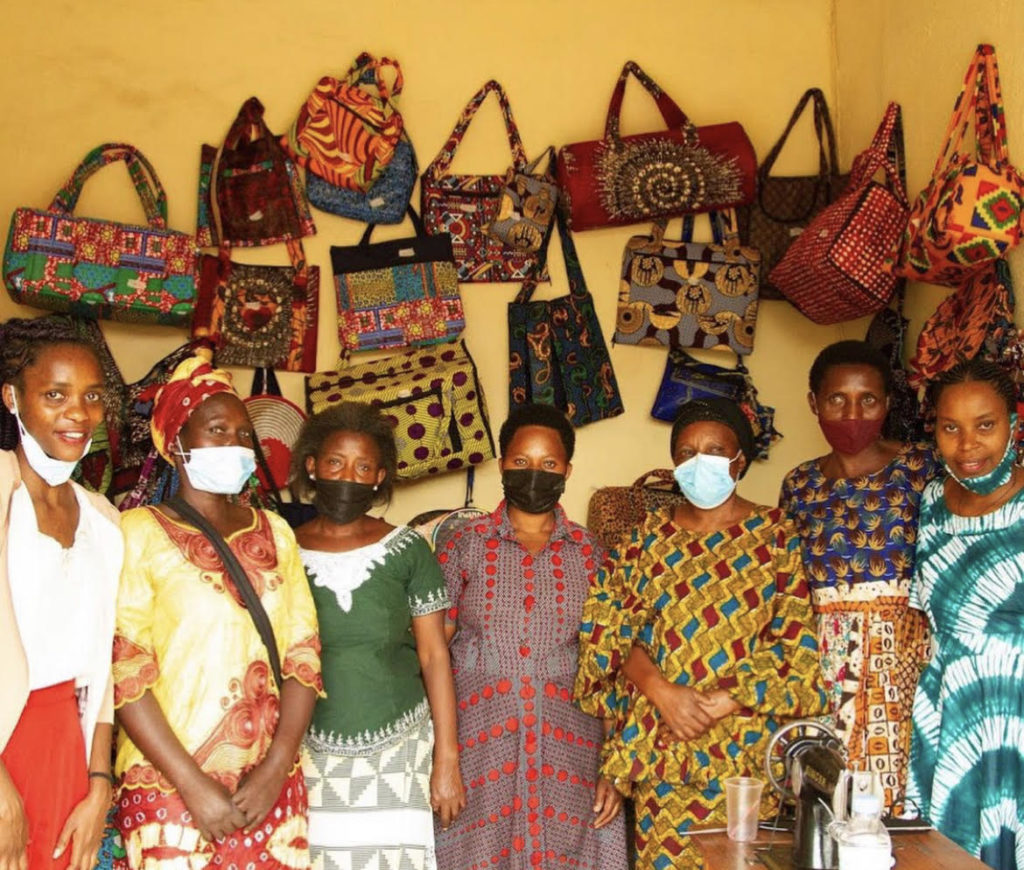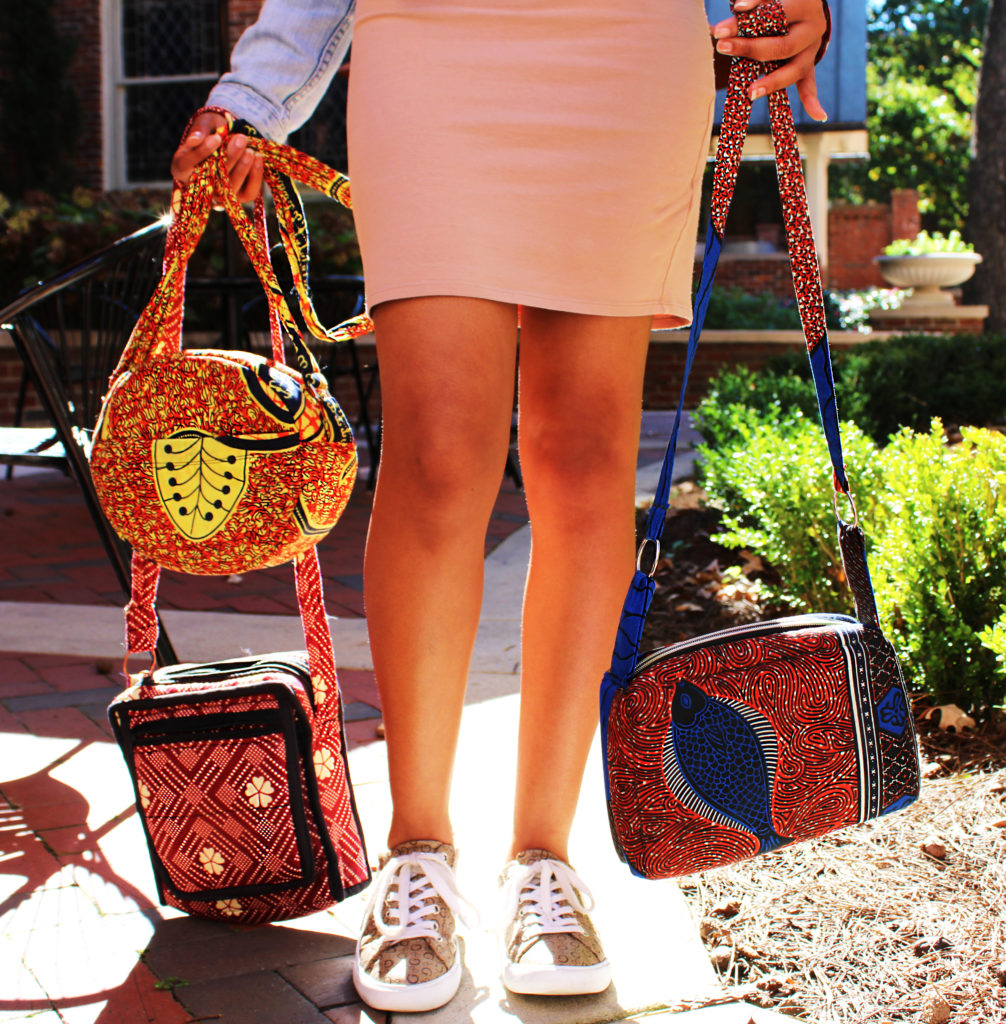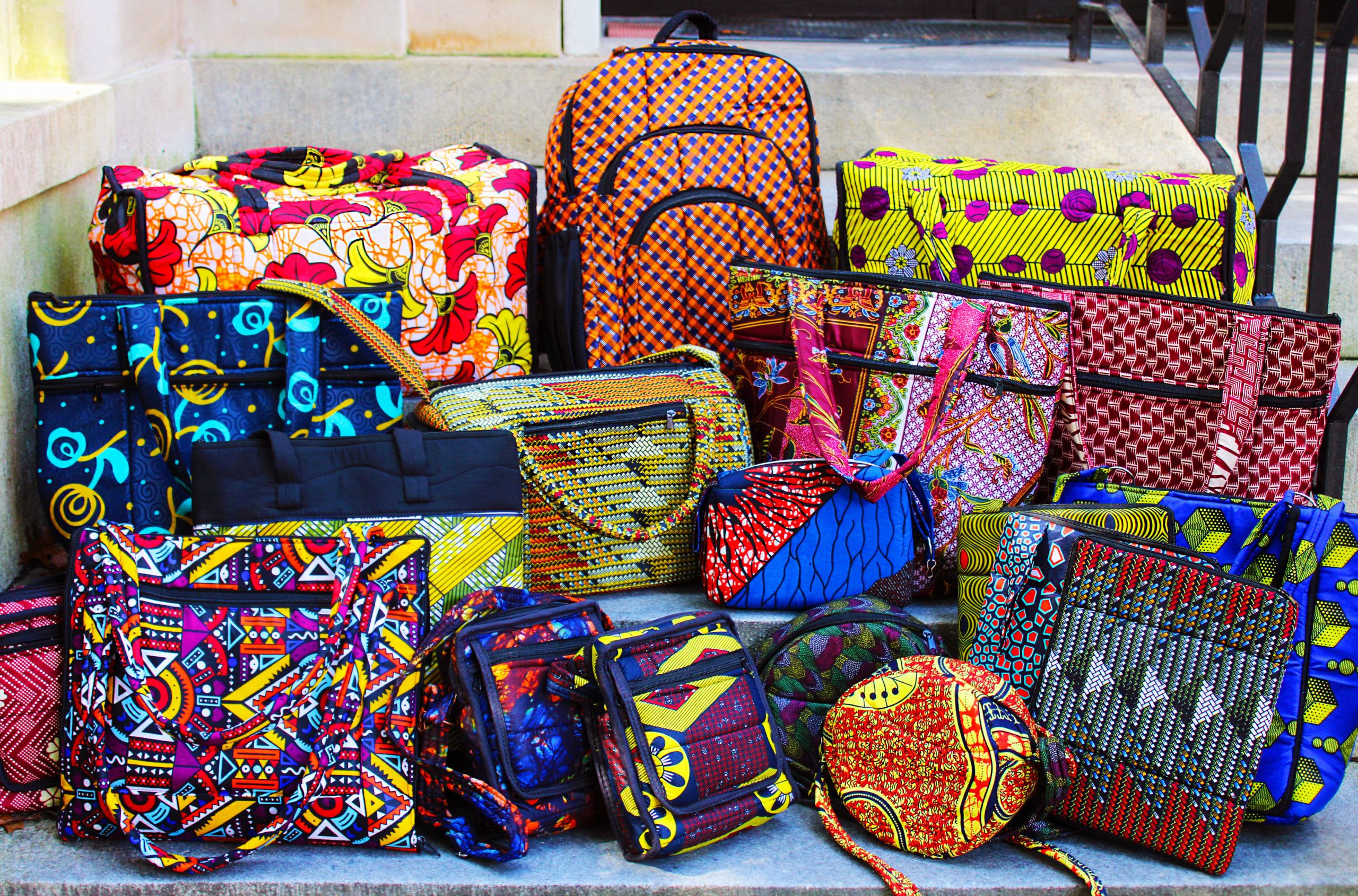Since 2015, Mercer students and faculty have helped Rwandan entrepreneurs—many of whom are widows and orphans of the 1994 genocide—enhance their businesses and increase their profits during Mercer On Mission trips. A group of women tailors they worked with dreamed of selling their products in America, and now a team from the School of Business is making that wish come true.
The handbags made by the women are now sold online at agaciro.com, and plans are underway to sell them in pop-up shops on the Macon campus and in local boutiques in the future. One hundred percent of the profits will go to Rwandan entrepreneurs.
During Mercer On Mission’s trip last summer, six Rwandan women with separate sewing businesses formed a collective partnership. The Mercer team helped them develop their business and marketing plans and develop their brand, called Agaciro. With competition from many similar businesses in Rwanda, the women needed to find new markets for their products and hoped to eventually sell them in the United States.
Two professors from the Mercer School of Business took this idea and integrated it into their courses, and a semester later, the “Rwanda Project” is operational. Dr. Laura Boman, assistant professor of sports marketing and analytics, focused on the start-up side of the business, while Dr. Mark Horn, associate professor of management and entrepreneurship, looked at the long-term aspects of the project.
“(During Mercer On Mission), we worked with this group of women to help them advance their business ideas and make their businesses more sustainable,” said Emma Drash, junior triple major in international business, marketing and management. “I absolutely loved them and loved making the trip. I wanted to find a way to continue the project. When I heard that classes at Mercer were going to be part of the project continuation, I immediately jumped on it and knew I wanted to do as much of it as possible.
Dr Boman said it was the story of Rwanda and the entrepreneurs that made him want to pursue this project.
“That’s what we’re really selling when we sell the products,” she said. “Their families live on the equivalent of one thousand US dollars for a year. It’s not a good life. They are very smart women, but they don’t know how to run their own business. When I heard about mission trips and the impact they had on their lives, I thought it was a great way to spread the impact.

Last semester, students of Dr. Boman’s one-year Marketing Research and Strategy course conducted focus groups, interviews, and quantitative studies related to target audience, products, name, logo, and price. This semester, they’re building the website, establishing a social media presence, and planning events and pop-up shops on campus to generate interest. The first pop-up store will take place from 11:30 a.m. to 1:30 p.m. on January 26 in front of Fresh Food Company at the Connell Student Center in Macon.
Dr. Marko Horn’s entrepreneurship students learn to write business plans, and last semester a group of students volunteered to write Agaciro’s plan. Students will continue to build on the plan this semester.
“The business plan idea is the big picture,” Dr. Horn said. “It becomes a roadmap of what this project can be in the future. Dr. Boman has the most operational knowledge. What is the next step ? The business plan will become the guide for this,” said Dr Horn.
Led by Dr. Horn, five students involved in the project entered the Next Big Idea competition in December and won first place and $2,500 in the nonprofit division. Team members included Martha Thompson, Brant Zulauf, Taj Patterson, Aaryanna Mercer and Drash, who is also a project manager for Dr. Bowman’s class along with chief marketing officer Jessica Walton. At the end of February, a team representing the Rwandan project will attend the first Southern Conference business plan competition at the Citadel.
Handbags, tote bags, laptop cases, duffel bags and backpacks are some of the Agaciro products that will be sold. The bags feature bright colors and interesting patterns and could be compared to the Vera Bradley brand, Dr Boman said.
“Our articles are really interesting and unique. No two will be the same. The fabric over there is in limited supply. They only make one or two items with a given fabric,” she said. “If you buy any of these products, you’re not only helping these women, but you’re getting a unique product that no one else on campus will carry around.”
Inventory is limited now, but the business plan will help bring products off campus to high-end boutiques and beyond, Dr. Horn said. Associate Professor of Marketing Dr. Etienne Musonera, who is from Rwanda and started the Mercer On Mission Rwanda program, will initially bring back products from Rwanda between semesters, but the entrepreneurship class is determining best practices to ship larger quantities, said Dr. Boman said.

The students have been busy working on the brand’s online and in-person presence, and the real fun begins now as the implementation of all the plans begins, said Aaryanna Mercer, a junior double major in management and marketing. who took the entrepreneurship course last. semester and is now in the second semester of the marketing course.
Drash and Walton developed an inventory system, and Walton established a barcode system to help track products, Drash said. In addition, senior marketing manager Emma Rose Bailey, who was also on the MOM Rwanda 2021 trip, did graphic design work and helped create the website – which went live on January 18 and will continue to do so. to be updated — and to set brand guidelines on her own time, since she didn’t take Dr. Boman’s or Dr. Horn’s classes.
The Mercer team brings the brand and women’s story to life in every way possible.
“You can buy a bag, have the bag, learn more about the history, find out who made it, and you know your money is theirs. I think it’s really unique,” said Drash, who is now in the second semester of the marketing class and is also taking the entrepreneurship course. “The more people you have who know our brand, the more people you have who buy and the more impact you can have on lives in Rwanda.”
Dr. Boman said many Mercer students don’t know about the Rwandan genocide because it happened before they were born. His students have taken a deep interest in it and are delighted to have the opportunity to inform others about this chapter of history. The project will be continuous and constantly evolving, with a new group working on it each year.
“Next semester will be a whole different group of students,” Mercer said. “We have to make sure that we communicate, that we write everything, that we save everything… Just to make sure that there is a solid base, so that it continues to grow and that it continues to benefit women, even after we graduate.”
This company is a great example of experiential learning, as students work on a project that will have an impact, Dr. Boman said. Students learn practical skills by performing real job tasks, Dr. Horn said. This real-world experience will prepare them for the job market and set them apart.
“It’s amazing for students because it’s as real as it comes,” Dr. Horn said. “I require my students to write a business plan anyway. If they don’t connect with projects like this, they’re going to write about another restaurant, something that will never come to fruition. Here, this project is real, and that’s what makes it attractive for students to work on it, because they know they can really make a difference in people’s lives. If it works as expected and as desired, it’s going to be a big deal.

